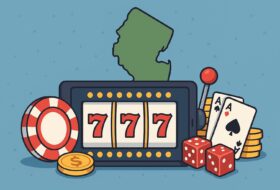
In the US, responsible gambling education is generally aimed at those who can legally gamble. That leaves a dearth of education for Americans under the age of 21. This may explain low rates of gambling literacy among younger bettors. Yet at the moment, there seems to be no systemic way of addressing that lack of knowledge.
If the issue of preventing gambling illiteracy among the young by educating those under 21 is discussed at all, it’s generally dismissed out-of-hand by pedagogical professionals. Their reasoning is it’s illegal at that age, so it’s too early to discuss it.
Once Americans can legally bet, operators do their best to educate them about responsible gambling. To that end on June 10, DraftKings and the American Gaming Association began a responsible gambling public service marketing campaign.
Meanwhile, researchers and responsible gambling advocates believe there could be a benefit to early intervention.
That belief seems to be more common internationally than in the US. Elsewhere, there are programs working to educate teens and, in some cases, children as young as nine.
One voice in favor of educating young Americans about responsible gambling is Keith S. Whyte, executive director of the National Council on Problem Gambling (NCPG).
He told Bonus.com:
If we don’t, we leave it to kids learning the facts (and myths) of gambling from equally ill-informed peers, bookies, illegal offshore operators, social media influencers, sports touts, etc.
What Difference Does Age 21 Make in RG Behavior?
Generally speaking, 21 is the age at which many states permit legal gambling, as well as other activities. However, some states allow individuals aged 18 or older to buy lottery tickets. Pennsylvania, for instance, allows 18-year-old lottery ticket purchasers to play, but they can’t gamble until they’re 21.
The reasoning behind that often comes from the retail casino industry. It urges lawmakers to set the gambling age to match the drinking age. For one thing, it avoids staffer confusion on gaming floors. However, US online gambling operators end up being held to these same age requirements.
Regardless, responsible gambling programs are generally available to of-age Americans by these legal gambling operators. Other entities do provide options, too, but are generally not as universally known to gamblers. Also, the organizations may not be pushing out the information. Instead, they’re waiting for interested parties to contact them and request it.
For example, Christine Reilly – a senior research director at the International Center for Responsible Gaming (ICRG) in Beverly, Mass. – answered Bonus.com‘s questions about her nonprofit’s CollegeGambling.org program. The program’s mission is to provide information about prevention and problem gambling to college and university students, parents, administrators and campus health professionals. The site also hosts educational material.
However, Reilly said:
We currently are not doing any outreach.
The ICRG is far from alone. Just about every touchpoint in a young American’s life – school, work or college – is devoid of responsible gambling education and outreach.
As a consequence, many Americans who find themselves legally able to gamble aren’t educated about the activity. So they’re starting from scratch.
In the US, Gambling Literacy Currently Comes from Gambling Experience
Here’s an example of low gambling literacy among youth: Only 30% of bettors aged 18 to 24 strongly disagreed with the statement “If I gamble more often, it will help me win more than I lose.”
That age group scored the lowest on that and other gambling literacy questions posed by NCPG in research the organization released in March, which is Problem Gambling Awareness Month.
Another example comes from the National Survey on Gambling Attitudes and Gambling Experiences. One statement posed to respondents was: “Gambling is not a good way to make money.” Only 27% of 18- to 24-year-olds strongly agreed, the lowest rate of any age group.
Conversely, those 55 and older strongly disagreed with both statements between 60% and 80% of the time. Across other age groups as well, there was a strong correlation, with the percentage of people giving appropriate answers rising with age.
Gambling Literacy Higher Among Online Gamblers, Non-Americans
Gambling literacy is higher among online gamblers, however, despite the fact that 78% are between 18 and 34.
About 53% of online gamblers strongly agree that “Gambling is not a good way to make money.” 43% strongly disagree with the statement that “If I gamble more often, it will help me win more than I lose,” and 45% with the statement “My chances of winning get better after I’ve lost.”
Dr. Richard Wood is a Canadian psychologist with the research and consultancy firm GamRes. He has studied gamblers in five US states and says that American gamblers score lower in literacy that Canadians, with younger Americans scoring the lowest of all. He told WWLP.com in January that he believed the lower US gambling literacy scores were due to less money being put toward responsible gambling efforts here.
For reference, a 2017 GamRes study his showed 26.9% of Canadian bettors aged 18 to 24 displayed low gambling literacy scores. About 36.4% had high literacy scores. A similar study it conducted in Massachusetts this year showed 38.1% of gamblers in the 21 to 24 bracket having low gambling literacy, and only 23.8% having high literacy. These scores only improved slightly in other groups up to age 44, but more dramatically thereafter.
Reilly cautioned Bonus.com about the informal nature of these studies, however. She said she didn’t know of “any peer-reviewed research on gambling literacy among youth.”
What Other Countries Do to Educate Young People About Gambling
Canada’s Responsible Gambling Association (RGA), which commissioned the Canadian GamRes study, provides responsible gambling information. That includes resources for 13 to 24-year-old residents of the Great White North. It does the same for their parents.
In one of RGA’s education efforts, Ontario high school educators can book performances of the live game show, “GAME BRAiN.” What that is is a simulated game show in which students compete against each other for 45 minutes on these topics:
- The risks of gambling
- The warning signs of a gambling problem
- The availability of help resources
Fourth- to sixth-graders can learn from the first level of its responsible gambling educational program, the bilingual interactive game called “The Amazing Chateau,” according to the International Centre for Youth Gambling Problems and High-Risk Behaviours at McGill University.
Even the Canadian Paediatric Society provides tips about teen gambling.
In Australia, the Raising Children Network says gambling can start when children are 10 and “most children have gambled by the age of 15.” A checklist advises parents begin talking to their children about gambling when they’re in primary school.
Educating young people should be included in the UK’s Gambling Act Review, urged Lee Willows in a Times editorial in April. The founder and CEO of the London-based Young Gamers and Gamblers Education Trust (YGAM) said:
I believe we have a responsibility to educate young people about the risks of gambling, just as we do on public health matters such as alcohol and drugs.
Also based in Great Britain, Epic Risk Management offers schools in-person awareness sessions. In these, students can learn from “reformed problem gamblers.”
Should Young People in the US Get Gambling Education?
“Young people gamble at nearly the same rate as adults,” Reilly told Bonus.com.
That means young Americans should be educated about gambling and what she called its risks to public health.
It’s unclear, though, if the risks of addiction are similar. CollegeGambling.org cited studies that were at least a decade old – with one dating back to 1991:
While the most recent research estimates that 6% of college students have a gambling problem, college students appear to mature out of these problems, as they do with alcohol and drug use, after college. This is evidenced by the fact that only 1% percent of the adult population has a gambling disorder in the US.
NCPG’s research found 7% of US bettors exhibited problem behavior. Its fact sheet about high school gamblers shows about that same rate among teens.
While Whyte does believe there needs to be more responsible gambling education in the US, he provided additional thoughts to Bonus.com:
One of the other big and probably related findings to the youth gambling illiteracy from the [NCPG] survey is that gambling addiction is still highly stigmatized, and that makes people reluctant to talk about it openly. Which hampers education. Whether you call it harm reduction/prevention/responsible usage or responsible gambling, it starts with de-stigmatizing, removing the mystery and mystique and talking openly about the risks and rewards. So yes, we strongly advocate for integrating gambling into other youth risk education and prevention, such as alcohol, tobacco, sex, etc.
American Children Already See Gambling
Children may first experience gambling in a seemingly innocuous form, such as a church bingo night.
Whyte continued:
Gambling is also interesting in that there are fewer physical or enforced age restrictions — you can’t police a deck of cards (nor should you) like you lock up your liquor cabinet. And in much of charitable gambling, the age may not even be 18. So it is hard to help give kids hard and fast guidance around gambling like we can with tobacco or alcohol. And we also know that risk for addiction and addictive behaviors tend to cluster. So kids who smoke are much more likely to gamble and drink. They overlap in complex ways driven by genetics, psychology and environment.
Problem gambling advocate Jamie Salsburg has two children. The blog author who hosts the After Gambling Podcast, told Bonus.com:
My kids are eight and six, and we’ve been talking about gambling directly or indirectly for several years. They’ve seen the blinking neon lights of the lottery ticket machines and have [asked] ‘What are those?’ So we’ve discussed how the lottery works. They’ve also experienced the frustration of not getting the Pokemon card or L.O.L. Surprise! doll they wanted [from blind bags]. So we chat about probability, expectations and emotions.
Kids are naturally curious and will keep asking questions. I just had to stop shutting down the conversation. I’m also careful not to frame gambling — or anything, really — as inherently good or bad, but that good or bad outcomes are often the result of misunderstanding or misuse. It’s really not as complicated as I first thought and I believe they truly understand it and are better prepared for the future.
Now the Hard Part – Educating US Youth About RG
If the US takes a uniform approach to educating teens and young adults about responsible gambling, what should that approach be? Should it be in schools? Should parents teach their children? Something else?
Salsburg knows of the UK’s programs, including Epic. He is himself a recovering gambling addict who last wagered on July 15, 2010.
However, he told Bonus.com he may not have the right answer:
I’m not sure we’ve had the depth of conversation and exploration into the topic to put together an effective program. I just know that it’s extremely important. So I’m taking ownership to make sure it is done within our home, rather than waiting for a program to be tested and launched.
Whyte told Bonus.com:
This is the paradox that applies to prevention across a range of addictive or risky behaviors. But over the last few decades, the science is clear and Americans now accept – for seemingly everything except gambling – that it is almost never too soon to talk to kids about things like smoking, drinking, sex, etc.





